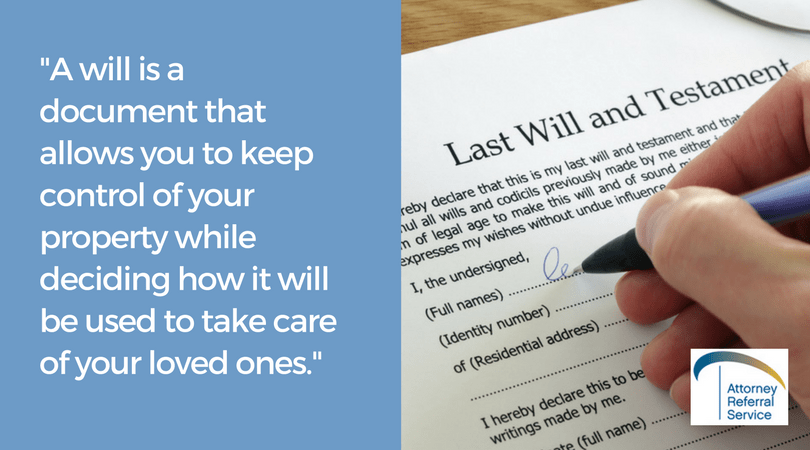What Goes in a Will?

Let’s talk about what goes in a will.
You can’t take it with you, so before you go, you may want to protect your family by deciding how your property will be given to your descendants. Putting your wishes on paper will give you peace of mind, avoid hassles and arguments within the family, and save your family time and money.
A will is an important document that allows you to keep control of your property while deciding how it will be used to take care of your loved ones. It will make sure all of your possessions will end up with the right family members or other people you designate.
The laws governing a will vary among the different states, but some of these general guidelines can help you plan your will and get the ball rolling. You will want to consult an attorney or estate planner to make sure your will is valid and therefore your family is taken care of.
What goes in a will as legal document
A will is simply a legal document in which you state what property will be distributed and to whom. It names a manager or executor who will manage your estate after you die. And it names whoever you wish to become the guardian of any minor children or dependents you may have.
The property listed in your will doesn’t have to be just the large items like homes and vehicles. It can also include personal or sentimental items like photographs and family items like silver or china.
You can be very specific about items and who they will go to. Aunt Sally gets the china. Cousin Frank gets the tools. Uncle Henry gets your favorite painting. Each person who is designated to receive some property is called a “beneficiary.”
There are some properties that are generally not covered by wills. These are insurance policies and retirement accounts that already list the beneficiaries you specified when you took out those policies.
You should periodically review those policies to see if anything has changed relative to the beneficiaries you have chosen. Keeping them up to date is important because they are the legal documents which will dictate who receives the benefits of your policies in the event of your passing.
Deciding on what property to list
Once you decide what policies, etc. already have beneficiaries identified, you can turn your attention to the other properties or assets you own.
You should be as specific and descriptive as possible when listing the assets or properties you wish to give to a beneficiary. If it is a vehicle, you should mention at least the make and model of the vehicle along with the year it was made. You want the court in general and your executor, in particular, to know exactly what you are talking about with each item.
Your will can cover your finances like cash on hand, bank accounts or stock holdings. It can cover family heirlooms like jewelry or works of art.
“Real property” is a term that refers to buildings, homes, or other forms of real estate, etc. Transferring real property can be a little more involved, so it’s a good idea to consult with a knowledgeable attorney when doing so.
Considering beneficiaries
In most cases, it is clear who will be given what, especially within the family. It is a little involved if you are considering leaving your spouse or children out of your will. In these cases, there is something called “Inheritance Rights” that you should check out with an attorney to make sure your wishes will be valid.
There is an extra step you may want to consider when naming beneficiaries. And that would be to name secondary beneficiaries, also called alternates or contingent beneficiaries, just in case your first choices do not survive you. Quite often, the first beneficiary is the spouse, and second beneficiaries are the children.
Selecting an executor
Every will has an executor.
That is the person designated to carry out the terms of the will. When selecting an executor, you should choose someone who is responsible and possibly familiar with your family and situation (although that is not necessary).
You should also make sure that whoever you choose is aware of being chosen for this responsibility and is agreeing to serve in this capacity. You don’t want the person selected to be suddenly surprised.
Choosing a guardian for your children
Parents with children under the age of eighteen are most concerned about their welfare in the event of the parents’ deaths. They want to make sure their children are cared for in the best manner possible, and they can do this by naming a guardian.
If parents do not have a will and pass away before their children become legal adults, the courts will decide who gets responsibility for raising their children.
Often, that decision means that the children will be raised by the spouse if still alive or possibly a sibling or other close relative. If you know who you want to raise your children, it is best to specify them as guardians in your will.
You can also leave property to your children or to young adults. In this case, you can designate an adult to manage this property as a property guardian or custodian. In this way, you can protect your child’s inheritance.
Making and signing the will
Once the document is created, you will need two witnesses who will attest to your identity as the person who signs the will. You sign and date the will in their presence. These witnesses should not be beneficiaries; otherwise, there might be conflicts of interest.
You can also use a companion document called a “self-proving affidavit.” This is a document that makes it easier for your will to go through probate court after your death. If you use this document, you should have it notarized.
Remember to tell your executor where your will is and how to access it in the event of your passing. Store the will in a safe place. Some people use home safes or safe deposit boxes or leave the Will with a family or town attorney or another attorney they select.
Are you in search for a certified attorney to represent you?
Let us help you find one today!



